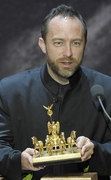 Amid the excitement of a new President’s inauguration, it seems natural enough that the deaths of veteran American senators Robert Byrd and Edward Kennedy were missed by the mainstream media. Fortunate, then, that the online encyclopaedia Wikipedia carried the news.
Amid the excitement of a new President’s inauguration, it seems natural enough that the deaths of veteran American senators Robert Byrd and Edward Kennedy were missed by the mainstream media. Fortunate, then, that the online encyclopaedia Wikipedia carried the news.
Only, of course, neither man was dead – it was a wiki-screw up and Wikipedia’s founder and “benevolent dictator”, Jimmy Wales (pictured), is furious about it.
Though this sort of mistake happens often enough in newspapers (remember Mark Twain’s famous response to reading his obituary: “the report of my death was an exaggeration”) Wales has decided that anonymous editing of the site is to blame, and he has suggested restrictions on who can contribute.
Wales wants the English-language version of the sites to follow the German, which means anonymous changes will be vetted before they are put online. In theory, this will prevent both mistakes and vandalism.
But the issues with these changes are already apparent with the German Wikipedia. Because the vetting process requires time and effort, changes are much slower to appear. On top of that, one of the core beliefs of the Wiki philosophy is that anyone can change anything on the site, as long as it is for the better. If that principle is eroded, then the whole point of Wikipedia is under threat.
I got started as a Wikipedia editor by correcting spelling mistakes that irritated me in an article. Many of my first edits were anonymous and I found the fact that I could contribute and make immediate changes to improve the site extremely exciting. In fact, the majority of minor edits I make are still done without signing in to my account because of the (admittedly minor) hassle. Without that initial feeling that I was doing something to make a difference, I might have quickly lost interest and moved on to something else.
Instead, through Wikipedia, I found Project Gutenberg and became involved in that too. I’m sure my story isn’t an isolated one, either. Although the majority of minor edits are done by a relatively small group, the large edits that add a lot of content are more likely to be made by individuals with an interest in the article’s topic. Many of these are anonymous edits.
The people in charge of these decisions need to be very careful about bias. Wikipedia takes great pride in its neutral point of view. If a smaller group of people are responsible for which changes stick, then there is there is a far greater possibility that they could push an agenda. Prominent editors are revered by the community and Wikipedia’s team of admins are chosen because they are “trustworthy”, but it’s far from a democracy.
Of course, there’s nothing to stop another site rising to take Wikipedia’s place, should the proposed changes prove unpopular enough. Wikipedia’s content is freely distributable under the GNU Free Document Licence. All that’s stopping another similar site springing up is the required webspace for over 2 and a half million articles! Wikipedia’s name might carry some weight. It is certainly very well-known now, but so was AltaVista or HotBot 10 years ago and who remembers them now?






Comments